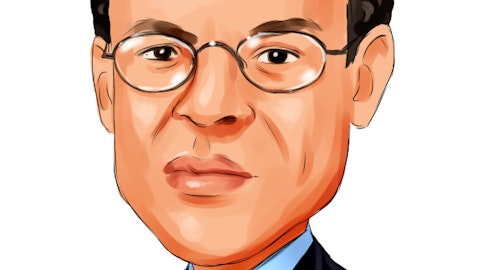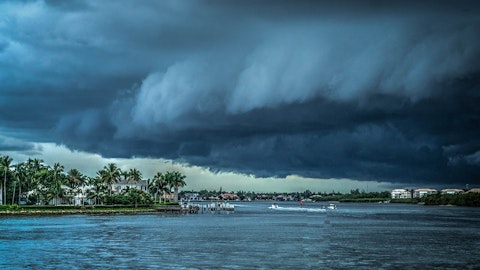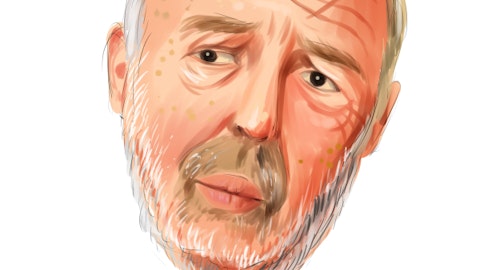Charlie Roberson: Good question, Gerry. One of the issues that the end users deal with is selection of the garment and what certification to go with. Currently, there’s only two other, well, there are a number of people trying, but there’s only two other companies that are actually offering, European certified gear in North American certified gear globally. Having that global reach and the ability to offer both product lines and explain the features and benefits of both is a tremendous service to the end users. There is confusion, for instance, in EMEA, there’s a lot of use of NFPA gear, but CE is also coming in. So it’s mixed and people don’t necessarily understand the trade-offs they are making. The differences in pricing of the gears as much as 30% or 40%.
So for the savings in CE, what are you giving up, it’s a tremendous amount of credibility, within individual markets and the ability to supply from a global manufacturing base makes us cost competitive. There are a lot of advantages. The number of people that are trying to do it, you know, the problem is they don’t have the global footprint that Lakeland has to support it. We already have that, you know, so the products are what we’re looking for.
Roger Shannon: Yes. What I would add to that and this — I think this is probably intuitive as well. We talked about, Charlie talked about, getting additional distribution channels due to our lead times, you know, having that full suite of products, you know, both NFPA and CE and then being able to be head to toe, just kind of strengthens that position with distributors. And we’ve also seen, and we expect to continue to see advantages in RFPs, because these smaller to medium size, customers it certainly would favor someone who’s able to deliver the full ensemble.
Gerry Sweeney: Got you. Super helpful. I appreciate it. I’ll jump back in queue. Thanks. Thanks, guys.
Operator: [Operator Instructions] Your next question for today is coming from George Melas at MKH Management.
George Melas: Good morning, Charlie and Roger. Congratulations, looks like a great quarter. Quick question on operating leverage seems like you had really nice leverage this quarter and margin — your breakdown of the OpEx and the OpEx increase was quite interesting, because it seems like there’s a lot of — there was sort of a lot of one-time expenses. Of course, there was a reduction in the year or not as well, but it seems like you’re maintaining with control over OpEx? Do you see that continuing to the future? Or do you feel like you’re going to have to, sort of, spend more money as you try to expand share?
Roger Shannon: Great question, George, and thank you for the question. We’ve alluded to having operating leverage in previous conversations in the past, including with you, I recall fairly recently. It was very good to see that be the case. And like you said, a large — a significant amount of the OpEx we saw in the quarter was either one-time or currency related and we are obviously like any company with taking measures to manage the currency risk. But we do believe we have operating leverage. We think our platform is currently scaled well to be able to manage this growth. So it was very nice to see that. And the other thing that I would add is we’re going to continue to put an even sharper focus on OpEx and OpEx reduction.
And as I’m sure you’ve heard Charlie and me say before, we’re very intently focused on free cash flow, and we’re looking to make improvements in that across the company and we’ll continue to focus on those items and hopefully drive additional efficiencies.
George Melas: Okay, great. That’s good to hear. And maybe can you tell us a little something on the issues with the monetary clients. I don’t know how much you can say, but I don’t know if just sort of explain a little bit what happened, and where you are, where you stand? And what are the options that you you’re considering?
Charlie Roberson: Yes. George, we’re very early in this process. As we said, there’s not much that we can add because quite frankly, we were still investigating and have a lot of questions ourselves that we’re still looking to answer. Suffice it, I think the best thing I can say about it is, while we are delayed and we are on pause, we don’t see an impact to future earnings or our operations or our ability to meet our forecast. That was our first concern. And we’re — we believe that we have that handled. There was a startup time associated with that business anyway. So it’s not an immediate impact to our projections. But right now, unfortunately, we just, you know, we’re waiting on some engineering reports. And once we have those, we’ll know more. But at this point, there’s not much else we can share.
George Melas: [Indiscernible] Thank you.
Charlie Roberson: Thank you, George.
Operator: We have reached the end of the question-and-answer session. And I will now turn the call over to Charlie for closing remarks.
Charlie Roberson: Thank you, Holly, and thank you all for joining us on today’s call. I’d like — I would also like to thank our employees for their commitment and hard work to execute on our strategic vision, which help drive strong results in the fiscal second quarter. We look forward to capturing the large opportunity ahead of us and building on the momentum we have achieved so far this year. Have a great day.
Operator: This concludes today’s conference and you may disconnect your lines at this time. Thank you for your participation.
Follow Lakeland Industries Inc (NASDAQ:LAKE)
Follow Lakeland Industries Inc (NASDAQ:LAKE)
Receive real-time insider trading and news alerts





